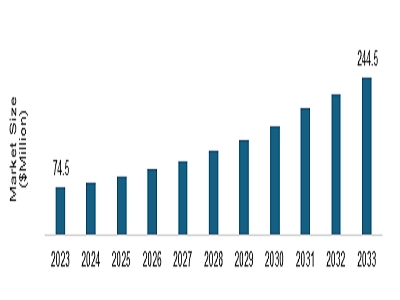According to the report, the South Korea flow cytometry market was valued at $82.12 million in 2024 and is expected to grow at a CAGR of 12.89%, reaching an estimated $244.5 million by 2033. This growth reflects the country’s strong emphasis on advanced diagnostics, precision medicine, and cutting‑edge research in biotechnology.
Flow Cytometry: A Cornerstone in Modern Life Sciences
Flow cytometry is a powerful analytical technology that enables rapid measurement and characterization of cells or particles suspended in a fluid. By using fluorescent markers and laser‑based detection, flow cytometers provide invaluable insights into cellular properties such as size, complexity, phenotype, and health status.
In recent years, the application of flow cytometry has expanded beyond traditional research laboratories. It is now widely used in clinical diagnostics, immunology, oncology, stem cell research, and drug discovery. In South Korea, the technology is also being adopted in areas like transfusion medicine and prenatal testing, reflecting a broadening scope that drives market growth.
Market Drivers
1. Expanding Clinical Applications
Flow cytometry’s ability to analyze thousands of cells per second with high specificity has made it indispensable in immunology, oncology, and hematology diagnostics. In South Korea, major hospitals and diagnostic laboratories are incorporating multi‑color flow cytometers to support early disease detection, monitor treatment efficacy, and guide targeted therapies.
2. Rise of Precision Medicine
With the government and private sector investing heavily in genomic and cellular research, South Korea has emerged as a hub for personalized treatment strategies. Flow cytometry enables precise cell sorting and biomarker analysis, accelerating the development of novel treatments such as CAR‑T therapies and stem‑cell‑based interventions.
3. Booming Biopharma and Research Infrastructure
South Korea’s thriving biopharmaceutical sector is fueling demand for flow cytometry in quality control and drug discovery. Academic institutes and research laboratories are also adopting high‑throughput systems for advanced studies in cell biology and immunotherapy.
Request A Detailed Sample on South Korea Flow Cytometry Market Analysis and Forecast, 2024-2033
Market Segmentation and Trends
The BIS Research report segments the South Korea flow cytometry market by products, applications, and end users:
-
By Products:
-
Instruments remain a significant revenue contributor as institutions upgrade to advanced analyzers and sorters.
-
Reagents and consumables are expected to see accelerated growth due to recurring demand and the expansion of test menus.
-
-
By Applications:
-
Clinical diagnostics dominate the market, with growing use in oncology and hematology.
-
Research applications in immunology, microbiology, and regenerative medicine are witnessing strong uptake.
-
-
By End Users:
-
Hospitals and diagnostic laboratories lead adoption.
-
Academic research institutes and biopharma companies are increasingly investing in advanced flow cytometry platforms to support innovation.
-
Regional and Institutional Focus
The market’s growth is concentrated in South Korea’s key innovation hubs, including Seoul, Daejeon, and Incheon, where universities, research centers, and healthcare facilities are driving adoption. Collaborative initiatives between local researchers and global technology providers are bringing cutting‑edge solutions to the country.
Competitive Landscape
The South Korea flow cytometry market features a mix of global leaders and regional players offering a diverse range of instruments, software, and consumables. Intense competition is pushing manufacturers to integrate automation, AI‑driven analytics, and miniaturized cytometry platforms.
Global players are partnering with Korean distributors and service providers to strengthen their presence, while local companies are developing customized reagents and support services to cater to domestic needs.
Opportunities for Stakeholders
The projected growth from $82.12 million in 2024 to $244.5 million in 2033 creates exciting opportunities across the value chain:
Instrument Manufacturers: Launch compact, high‑throughput systems tailored for hospital and research use.Reagent and Consumable Providers: Expand product portfolios to meet growing clinical and research needs.Healthcare Providers: Integrate flow cytometry into diagnostic workflows to improve precision and patient outcomes.Investors: Leverage high‑growth potential in South Korea’s expanding biotechnology and life sciences market.
Future Outlook
The projected growth—from $82.12 million in 2024 to $244.5 million by 2033—highlights South Korea’s robust adoption of cutting‑edge analytical technologies. As personalized medicine, immunotherapy, and regenerative medicine become mainstream, flow cytometry’s role will only grow stronger.
Investments in R&D, government initiatives to support biotech innovation, and increasing collaboration between academic and commercial entities will drive further expansion. The emphasis on early disease detection and continuous monitoring will sustain demand for flow cytometry in both clinical and research settings.
Conclusion
The South Korea flow cytometry market is on an impressive trajectory, reflecting the country’s commitment to innovation in healthcare and biotechnology. From expanding research initiatives to clinical diagnostics and industrial applications, the adoption of flow cytometry is set to transform how diseases are studied, diagnosed, and treated.
With a market poised to grow at a CAGR of 12.89% and reach $244.5 million by 2033, stakeholders—including instrument manufacturers, reagent suppliers, healthcare providers, and investors—are well‑positioned to benefit from the opportunities in this dynamic market. South Korea’s focus on precision medicine and technological excellence ensures that flow cytometry will remain a cornerstone of its life sciences landscape for years to come.
About BIS Research
BIS Research, recognized as a top market research company, specializes in market research reports and advisory services focused on deep technology and emerging trends that are poised to disrupt key industrial markets. Annually, we publish over 200 market intelligence reports across various deep technology verticals.
Our insights support leaders across industries in making informed decisions based on deep market analysis, competitive intelligence, and strategic forecasting. We work closely with innovation-driven stakeholders across data centers, energy & Power, healthcare, and more. We help businesses stay ahead with in-depth reports, custom research, and go-to-market strategies tailored to your goals.
Media Contact
Company Name: BIS Research
Contact Person: Bhavya Banga
Email: Send Email
Phone: +1-510-404-8135
Address:39111 PASEO PADRE PKWY STE 313, FREMONT CA 94538
Country: United States
Website: https://bisresearch.com/industry-report/south-korea-flow-cytometry-market.html

